#Having people show support for Palestine in Eurovision would work against that
Note
all non participating countries have their flags banned at eurovision
I'm well aware. I wrote that in the translation.
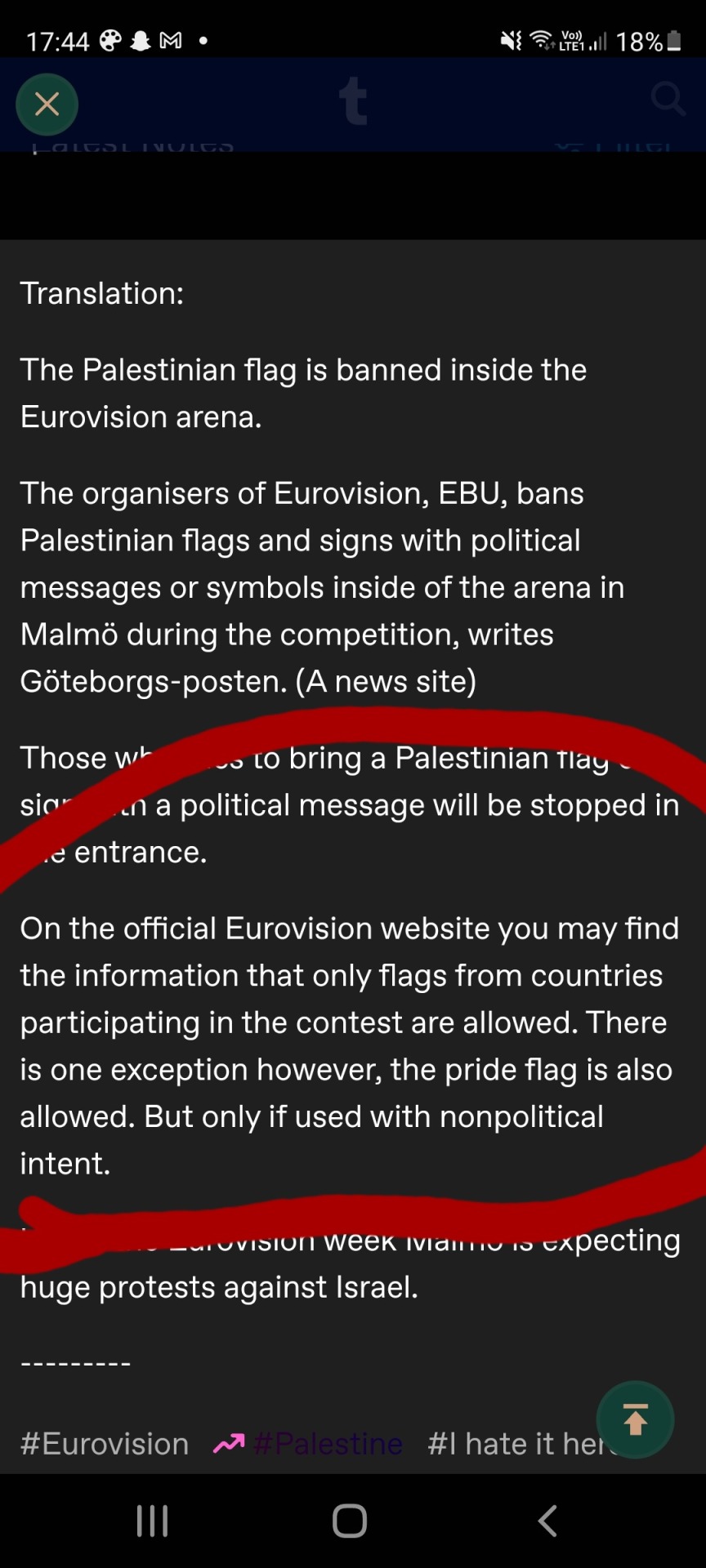
#Sorry if this comes across as rude I do not mean it to be#I just wanted to actually check that I wrote it in and then took a screenshot so that you wouldn't have to look for the post again#I am still allowed to be unhappy about this tho#Yes I am aware that they are not participating#but I believe that people who are going to Eurovision should still be allowed to show their support#What is happening in Palestine right now is horrible and people should be allowed to show their support for the people#And Eurovision would be a good place to show it#It is a big thing and people from all over the world watch it#If the terrible happens and Israel get away with the genocide then the history books will be written from their point of view#They have been actively destroying landmarks so them trying to erase Palestine from history doesn't seem farfetched to me#Having people show support for Palestine in Eurovision would work against that#Because people in the future will look back at Eurovision from this year and would see the flag#I am probably overreacting but I wanted to get my feelings out#Eurovision#Palestine
5 notes
·
View notes
Note
Honestly, really disappointed that Cate Blanchett was the only person who supported & spoke out about the children in Palestine & Congo being massacred.
I’m disappointed in them & disillusioned & mad that they don’t care cus they’re cocooned in their life of wealth & celebrity & worry about their careers. Looks like I f it doesn’t affect them directly, then they don’t care.
I know these relationships we have with celebrities are all parasocial ones. & I know they put on a profile for the public, but Sebastian & Tom Hiddleston ( unicef goodwill ambassador FFS) seem like good people from all their public appearances.
Palestine always exposes people for who they really are.

Hi! Thank you for sending this message what is happening in Congo and Gaza (to Palestinian people) is so barbaric, so tragic and so heartbreaking!
The fact Cannes banned all types of protests says a lot (same goes for Berlinale, Eurovision etc).
The authorities of many countries are not applying the same treatment to Israel as they do to Russia because politics... because they want to have them as an ally in the geographical area and because their army and power is >
To be honest, many of us are not educated about Palestine and Israel, and the media spreads fake news so much everywhere. The info is also tricky and many people really have no idea how to even research correctly. I was not taught in school about this at all back in the day.
About Congo, they do not even speak! I barely saw any news, and it's absolutely tragic!
Some celebrities are in their own bubble, indeed! Some believe and spread fake news, some are scared of being fired or directors not wanting to work with them anymore (even big names... they usually have tricky contracts, especially if they are a part of an agency), and some simply do not care because it's not something that's affecting them directly.
Some people who spoke were so uneducated and spread fake news... not even intentionally sometimes, but the harm was done. I'd rather see them silent if they are uneductaed and unwilling to educate themselves over spreading fake news and making everything worse.
I am not defending anyone, though. Innocent people die and people with power (especially authorities of countries with power) do not care because it's all about their advantages.
But Hollywood would not hesitate to fire people: crew or cast (like Melissa Barrera), big names included, if they speak against the genocíde in Gaza.
To quote the Guardian: Israel has historically enjoyed staunch support in Hollywood:

[Source here]
Cate B. and Ali Abbasi speaking up = really important and needed!
I can understand the disappointment, I'd lie if I said I am not... but I think Sebastian and Tom are pro-Palestina. Especially SS based on his past, his culture, his previous posts on other causes, his choice to play in The Apprentice and show a sick system etc. But I wish he was active on social media and posted links to donate.
They all should educate themselves and do something about it! We all need to...
3 notes
·
View notes
Text
A Song Called Hate - review
I was at the premiere of A Song Called Hate tonight! This is a new English-language documentary film primarily about Hatari's Eurovision journey. There's a lot of delightful new footage that you all are going to love, lots more insight into the emotional journey of the Eurovision trip, their experiences in Israel and Palestine, and the soundtrack by Margrét Rán (from Vök) was fantastic - the film built a beautiful sense of tension out of events that we all already know about. For any Hatari fan it should be a treat.
The film has no narration and relatively little new interview footage, which surprised me a bit - the focus is on showing interesting bits of what happened over the course of this experience, more than presenting a clear narrative of what happened and why. I expected the film to get into the band's motivations for participating despite the calls for a boycott, but it didn't really - in fact, just from what's shown in the film, you'd be forgiven for walking away from it thinking they just wanted to participate in Eurovision and had no particular interest in Palestine until after they won Söngvakeppnin! In reality, before Söngvakeppnin Hatari had published a long statement on why they sought to participate in a contest taking place in Israel given the state's crimes against Palestinians, arguing that since it had been decided Iceland would be participating, they believed whoever represented us should be someone who would use their influence to draw attention to the issue and highlight the absurdities involved. Similarly, the film doesn't actually (as far as I noticed) show or mention the fact RÚV had already made the decision that Iceland would be participating, and that Hatari had supported boycotting the contest prior to this. I expect various other parts might also be confusing to someone who doesn't know Hatari at all and doesn't watch Eurovision - Andrean's iconic flag waving is referenced, for instance, but no footage of it is shown, the fact there's such a thing as "getting to the final" is mentioned but the semifinal is skipped over entirely without comment, and there's no explanation of how Eurovision works at all in general. So if you show it to non-initiated friends, you may want to be handy to explain and clarify some things! Despite introducing how the band came to be at the beginning, this is very much a film made for people already familiar with the band and what happened at ESC 2019.
The most fascinating thing about the film, to me, was seeing just how up in the air everything was until the last minute. They were throwing a lot of ideas for what they might do around (Matthías said during the Q&A that there were a lot more ideas than even what we see in the film, that they were talking over four or five new ideas every day) - they've said that before, technically, but I was imagining a plan A, plan B, plan C sort of thing. In reality, it seems it was all a whole lot more human and haphazard. They knew they wanted to stage some form of protest, but had no idea what kind and were constantly discussing this back and forth with Bashar and others while they were out there, with the deadline of the final looming, while unsure how they could even go about it - they talk about how, for instance, if they didn't perform the song the way it's supposed to be, the Eurovision broadcast is on a delay and would simply switch over to prerecorded footage, with the audience none the wiser that anything had happened. (I wish the film had had time to show the discussions before the semifinal, too, when they couldn't have been sure if they would make it to the final at all - I'm sure those were fascinating, too, but there's a lot going on in the film and I understand the decision to focus on the final.) There's even a moment where they've kind of resigned themselves to maybe just not doing anything more, just performing the song. When Bashar senses their resolve wavering, he clearly feels kind of hurt and betrayed, implores them to not just talk but act - and then, in the end, probably spurred by Bashar's words, they send Iceland Music News out, in the middle of the night, to get them the Palestine banners that they would so memorably pull out in the final.
Ultimately it's a very humanizing thing, seeing how despite how long this group spent brainstorming a protest, going to Hebron, collaborating with Bashar, all with this burning intent to make a statement, they're simply people in a deeply stressful situation trying to come up with a way to use their art to do something that's in some way meaningful for this very real struggle, and in that weird, tangled situation, in a stressful moment, they might just want to think maybe this is it, maybe they're done, maybe this is enough and then they can breathe. It was an emotional punch for me seeing Bashar getting so worked up on the screen and realizing how he must have felt watching the final, genuinely not knowing what to expect, half thinking his new Icelandic friends might have just chickened out entirely. But, as Matthías says afterwards, as they're all together variously recovering from panic attacks or hugging each other or trying to recover their composure, in the end there was no other choice. They had to do something, and they did. And we're all grateful for it.
There's a moment, afterwards, of Matthías, Klemens and Einar in a dressing room, with Einar talking about how he'd kind of wished they'd be kicked out of the contest. Matthías goes God, yes, that would have been such a relief. It's such a raw thing to hear. They laughingly conclude that if they'd gotten kicked out then the Icelandic nation would have rejected them, too; they'd have pissed off everybody. As Hatari as that would have been, I think we're all ultimately glad they didn't, though.
All in all, a gripping, very human film about a group of young artists trying to do the right thing. I hope you all get a chance to see it soon!
70 notes
·
View notes
Text
Eurovision 2010s: 65 - 61
65. Michael Schulte - “You let me walk alone”
Germany 2018
youtube
[2018 Review Here] (shared with Eugent)
When Germany revealed this homely carrot top as their entrant I of course IMMEDIATELY rolled my eyes at it. Discount Ed Sheeran, GTFO!! Idk what the general lowdown on Ed Sheeran is, but good lord that man is responsible for some really BORING and GENERIC music (I will never get the obsession with “Perfect”, ever.) and as you can expect that also bled into my initial opinon of Michael.
However, two things. A of all, “You let me walk alone” is a much better song because it is actually VERY catchy, in a good way. ONE love / TWO hearts / THREE kids / LOVING mum is among the more memorable hooks in this decade.

Secondly, Michael’s emotion is *real*. This is a song about his coping with his dead father and well... I am not made from stone. Dude was in GENUINE TEARS during the endgame!! And as someone who deeply loves his father, I can definitely empathize with that message on a personal level.

There are better songs around. There are better performers around. There is better emotional pull left in this ranking. Regardless, Michael was able to stun me into teary-eyed silence and that is a feat which earns nothing less than RESPECT.
________________________________________________________________
64. Softengine - “Something better”
Finland 2014
youtube
FANTASTIC INDIE ANGELS <333 The appreciation I have to Softengine I have is obvious, yes? Highly energetic indie rock song from one of my favourite Eurovision countries. 😍 That also did VERY well because it’s genuinely that good. Take THAT Finland bullies!!! #HeyaSuomi
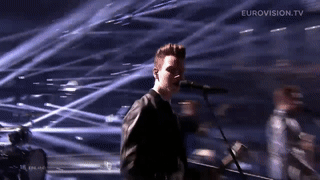
However, Softengine offer even more than just a kickass rock song. They offer some of my favourite song lyrics ever? They are both puzzlingly weird and endearingly ESL
Even Human Bound
People Rolling Dice
Such A Novel Life She Thought
While Knowing Nothing At All~
What on earth is Topi singing about? 😍 Well actually, it’s the story of an old man looking back at the life he’s had and.. It actually has a LOT of emotional pull wtf? Take a look at the bridge:
ALL THESE WORDS
SHE MEANT TO SAY TO ME

ALL THESE WORDS
AGAINST MY FAITH
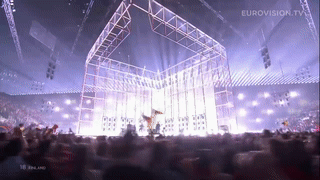
ALL THESE WORDS
BEFORE SHE PASSED AWAY

ALL THESE WORDS
WILL NEVER NEVER NEVER CHANGE

A wonderful display of juvenile energy that has me coming back craving for me. SHOULD HAVE BEEN TOP 10 but lol it’s Finland when is Finland not getting bullied by people with no taste. 😭
________________________________________________________________
63. Litesound - “We are the heroes”
Belarus 2012
youtube
More rock angels. 😍 However, Litesound rank on the other end of the quality spectrum, being great because of their incompetence.

Honestly, I don’t think there’s anything more endearing when the inept give it their all, completely oblivious to their amateurism, a description which -let’s be honest- is “Belarus in Eurovision” is in a nutshell 😍. Well that plus the hilariously rigged NF, remember that ALYONA LANSKAYA originally won Litesound’s NF and then had to bequeath her spot to them when her voting fraud was exposed. 😍 It’s not even the most hilariously rigged NF of the decade though, omg YES we shall discuss that whenever it’s “Samo shampioni’s” turn. 😈
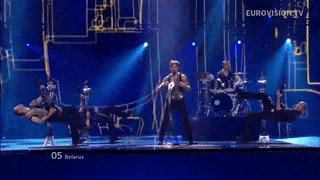
Anyway, Litesound bring the a double whammy of hilarity with some A+ Bad English diction (let us all sing along)
WONEVER STEN INDO AR WEH
WHEEL MEK IT FRU DE DEH
CUZ WE AR DA WEINERS
WE AR DA GEEROS
WIR BRACKING DOWN DA WALLZ
GODDA HIT DE MALL
CUZ WE ARE DA GEEROS
WE ARE DA DRIMURS
and the fact that all Litesound members look like animals, introducing:
The seahorse
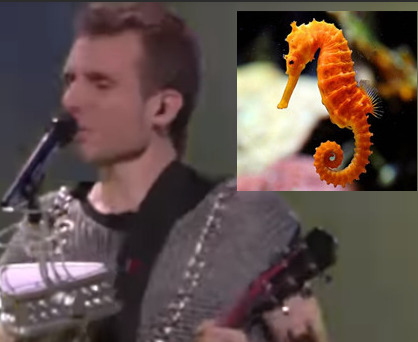
The afghan greyhound
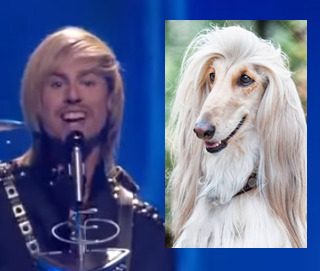
the mongoose

and of course Dima who might be the lovechild of Alsou and an ostrich. 😍
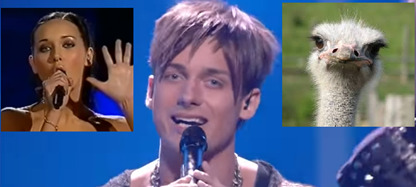
All of this may make you believe I merely stan Litesound on an ironic level, but I actually LOVE them on an unironic level too. “We are the heroes” is a fun, futuristic electronic rock rollercoaster and Litesound strike a perfect balance between good song, disarming incompetence and going ALL OUT in proving themselves as high quality, laced with high voltage addictive rock beats. SO, NO MATTER WHAT THEY SAY, NO MATTER WHAT THEY DO, I’LL MAKE IT ALL RIGHT! I’M BRACKING DOWN THE WALLS, THEY ARE THE *HEROES*
________________________________________________________________
62. Justs - “Heartbeat”
Latvia 2016
youtube
AGE OF AMINATA <3 what a glorious two-piece act in the herstory of Latvia. To Latvia’s credit they completely reinvented themselves in the Supernova Era, usually resulting in bold entries (and Carousel).
If "Love injected” was the earthquake that shook Latvia AWAKE with her experimental masterpieces, then "Heartbeat” is the aftershock, providing the same avant garde novelty, but not as impactful with a lesser impact.
However, to recycle a phrase i’ve already used multiple times, a lesser Aminata is still fucking awesome. “Heartbeat” packs a massive emotional punch, being more aggressive and volatile than its predecessor, which... works out fine actually. Killer lines such as:
YOU’RE MY DESIRE AND MY PAIN
BUT ALL THE BATTLES ARE IN VAIN
YOU MEAN MORE THAN ANYTHING TO
MEEEEEEEEEEEEEEEEEEEEEEEEEEE
need an emotionally intense delivery and Justs fucking GOES for it without any inhibitions for his own health and safety
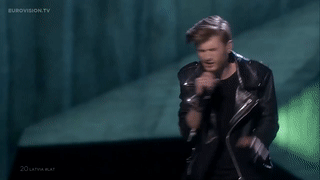
and with every passing second
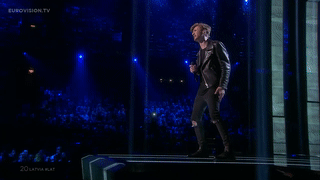
he gets more into the zone

right until the end, when he LOSES his voice and is reduced to panting an aspirated ”thank you”. 😍 If you’re going to sing about lost love, you’d better do it by also SCREAMING YOUR LUNGS OUT <3
________________________________________________________________
61. Hatari - “Hatrið mun sigra”
Iceland 2019
youtube
God I’ve been dreading this write-up. Not because of the Hatari stans (lol who is going to complain about getting ranked 61st out of 408), but can I do Hatari justice in print? Hatari weren’t as much as an entry as they were the fiery spirit of mischief, an existential manifestation of defiance, a gestalt of provocative resistance, all contained in the tiny package of two asshole hellraisers.
Yes, assholes. You see, the one thing you NEED to understand before everything else is that Hatari’s poetic palestine shawl moment is one of grade A assholery. Pulling that at the last sec towards their hosts WAS a dick move and Hatari were fully aware of it. We MUST see this as a fact before we discuss anything else that is also Hatari-related.
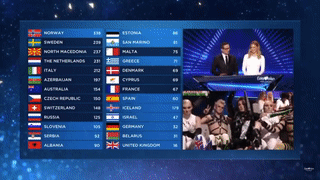
However, that’s precisely the point? Provocation was the sensation that swept the icelandic nation and its idolization became Hatari’s vocation with dedication and its application in the humiliation and the vexation of the Israeli station in support of the Palestine civilization, leaving KAN in devastation after months of the rabid disorganization was a justification well worth the potential probation. In other words: GET REKT KAN SHIT HOSTS HOPE U GET BLACKLISTED LOLOL #Hatredwon 😈 😈.
ps: still getting the Israelis to cheer for them despite being OPENLY pro-palestine when will ur faves.
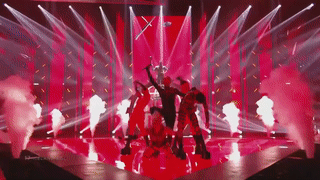
~My reasons~ for ranking Hatari lower post-show are less grounded in the politics (again, they were jerks but... that’s also the entire point of sending Hatari lmfao) and more determined by the actual live performance: I thought Klemens was underwhelming and his parts of “Hatrið mun sigra” were also the fave bits. 😭 On the flipside I thought Matthias was excellent (when he didn’t miss his cue) and I legit laugh out loud each time I see his hilarious OTT facial expressions.
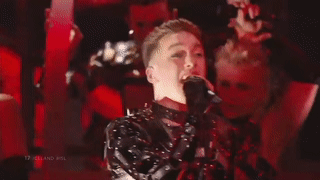
What a justified use of guyliner <3 The act was yet again a diabolically brilliant clanging of chains, bashing of mallets, grinding of gears, steaming of punk, a satanic cirque du soleil come to rain justice and brimstone down on our hopeless souls. Hatari were the anti-heroes we needed and don’t deserve.
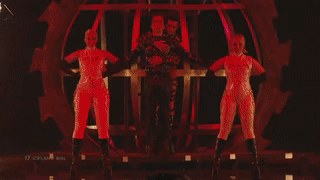
ps: i hope i will ever find someone who loves me as much as Klemens loves Teresa May.

Iceland’s chart looks much better than I thought it would, but the averages actually put them somewhere in the middle on average. Iceland are always hit-or-miss for me, much moreso in the 2010s than in any other decade and it’s largely down to them failing to pick the best available option because, you know, BadTastitis.

the next update... will be the FINAL one in this shade of green :o
Yes, we are about to move on to the highest, upperest, bestest tier of Eurovision entries. The mind-blowingly amazing entries that are not off this fucking world. Find out who makes the cut and who doesn’t TOMORROW :o
#Eurovision#Eurovision Song Contest#Iceland#Latvia#Belarus#Finland#Germany#Hatari#Hatrid mun sigra#Justs Sirmais#Heartbeat#Litesound#We are the heroes#Softengine#Something better#Michael Schulte#You let me walk alone
46 notes
·
View notes
Photo

This interview with Klemens and Anna Hildur (director of A Song Called Hate) appeared in Fréttablaðið the other day. Translation below.
"Really this is a documentarian's dream, working so closely with the subject," says filmmaker Anna Hildur Hildibrandsdóttir. She produces and directs the documentary A Song Called Hate, which will premiere at RIFF later this month. The film is about Hatari's participation in the Eurovision Song Contest in Tel Aviv in Israel in 2019, with Anna Hildur and her camera crew following the Hatari group to Israel and Palestine.
Klemens Hannigan, one of the members of Hatari, says the idea of a documentary in connection with Hatari's Eurovision participation came about early in the process. "When we decided to go ahead and participate in this contest and as we were shaping the performance and the message we wanted to convey, we already had the idea of documenting this process somehow ourselves," Klemens explains.
He says originally, though, the idea was to create a staged documentary, or 'mockumentary'. "As Hatari we want to stage everything, but then it dawns on us, when Anna has been brought in and starts to propose that this should just be a documentary, that the subject was both so fascinating and so important that a mockumentary wouldn't have done it justice," says Klemens.
Anna, who recently entered the film industry after over twenty years in the music business, proposed the idea of the film to her collaborators in Britain and began to look for a director for the project, which she was only planning to produce. "I contacted Iain Forsyth and Jane Pollard, who directed 20000 Days on Earth with Nick Cave, and I told them I needed people like them for this project. Then I searched and searched for a director until they told me I'd just have to step in and do it myself, which I did," says Anna. "They promised to help and are executive producing the film."
Hatari vulnerable
Hatari's Eurovision participation was shrouded in mystery and neither the Icelandic audience nor the international one could predict what was coming.
Anna and Klemens say that in the film the audience gets to experience the contest and everything that came with it in a different way. The members of Hatari appear vulnerable and out of character. "There was a lot of vulnerability in being the subjects of a documentary, for us, because up until this point we had never opened up as Klemens, Matthías, Einar or the others, but it was much harder to maintain that silence and stage every moment during the contest," says Klemens.
"It was really important to catch them vulnerable and out of character, and it was a very close collaboration. We were out there with them for 18 days and it was a really unique time," says Anna. "I was very conscious that I had to stay a bit outside it all and keep my head screwed on straight, because it was a lot of work and no day was the same," she adds.
The message as the primary objective
Klemens says there was a lot of pressure on Hatari during the contest as well as in preparation for it. They were part of the Eurovision-bubble, as he calls it, part of the RÚV team and the subjects of the documentary, but their primary objective was to spread their message and take a stand against the Israeli occupation of Palestine.
Before Hatari's participation in Eurovision last year, opinions were divided on Iceland's participation. According to a poll by the Zenter research group for Fréttablaðið in May last year, a quarter of the population wanted to boycott the contest to support Palestinians.
"The reason we participated in this contest was that Iceland was going to participate, there would be some participant going to Tel Aviv on Iceland's behalf, and we felt that given that was happening, that participant should try their best to raise awareness of the horrific situation going on there. We wanted to show our stance in action," says Klemens.
"I thought it was very interesting to make a documentary about how they did, and it was not at all clear what would happen on this journey, there were so many unknown variables the whole time," Anna says.
"We hadn't planned anything one hundred percent but we had certain ideas about how we could support Palestinians and raise awareness of the occupation. It was always like we were jumping off a cliff because we never knew what would happen next," says Klemens. "All we knew was that the further we got, the more attention we would get and the more people would hear our message."
"For the documentarian, what mattered most was that they'd stay in the contest as long as possible, and we knew the stunt wasn't going to have any real impact unless they made it to the grand final," says Anna.
Important to use the airtime
They say that the collaboration went well and that the making of the film went smoothly. "There was basically no tension between us. We always got to know as much as possible about what would happen next, but it was frequently very exciting and even stressful. For instance, the electrified atmosphere in the green room after the final when the Palestine banners had been shown, the camera crew didn't know that ahead of time," says Anna.
Asked whether the stunt had been planned ahead of time, Klemens says it wasn't. "There were a lot of ideas going on. Whether we should get expelled from the contest, or just be completely silent on stage, say nothing at all, and then we had the banners under our clothes. When we saw we weren't getting any points from the juries and were not about to win, we realized that these would be the only seconds we'd have on camera, and we had to use that airtime."
The members of Hatari have spoken about the importance of using their agenda-setting powers and giving a voice to those who lack it; Hatari interviewed many Israeli and Palestinian activists and artists while creating the film and during the contest. Many of the connections they formed are still going strong, perhaps especially their relationship with Palestinian musician Bashar Murad.
"He was our connection to Palestinian culture and the suffering that they've been through and is still ongoing today," says Klemens. "Our collaboration with him and other Palestinians was a huge part of passing on our message," he adds.
"The art of taking a stand is the theme of the movie, as well as seeing the role of art in a social context. It can be controversial to participate and not boycott, but the dialogue between people is important. I wonder if cultural and academic boycott is truly effective in the fight for change," Anna says, adding that the journey to Israel and Palestine and the creation of the film will without a doubt be among the most memorable in her life. "I think the whole group that went there shares a life experience that we'll always keep with us, and the message will live on in the film," she says.
"We communicated the message primarily through the provocative act and our collaboration with Bashar and other artists, but now the documentary will follow up, give the act an ongoing life," says Klemens.
A Song Called Hate will premiere at the international film festival RIFF on Friday September 25th in Bíó Paradís. It will then become available on the website riff.is, as the festival is in an unusual format this year because of the coronavirus pandemic.
61 notes
·
View notes
Text
Dancer interview on A Song Called Hate - translation
This interview in Fréttablaðið, published the day after the premiere of A Song Called Hate (but taken before it), features Andrean, Sólbjört and Ástrós discussing the film, their experiences in Israel and Palestine, the stress of the spotlight, and their passion for human rights.
A difficult reckoning after Eurovision
Andrean Sigurgeirsson, Ástrós Guðjónsdóttir and Sólbjört Sigurðardóttir, the dancers of the band Hatari, say the premiere of the documentary *A Song Called Hate*, which was shown at Reykjavík International Film Festival last night, brings mixed feelings. The film is about Hatari's participation in Eurovision 2019 and the controversial placement of the contest.
As the nation knows, Hatari went to Tel Aviv on Iceland's behalf last year and caused a kerfuffle by holding up banners with the colors of the Palestinian flag on the live broadcast on the night of the finals. "I still avoid thinking about the final night and the feelings I was experiencing," says Sólbjört, who believes she had a nervous breakdown that night.
"It was really hard being out there and I was afraid I'd never see my child again and couldn't get home." The experience of irrational anxious thoughts was synonymous with the stay in Israel. "That's why it's been uncomfortable to think about."
Processing the experience
The dancers are all still processing the experience of the trip. "I realized later that I'd disconnected from my emotions just to get through what we were doing."
Andrean agrees and says he's still taking in this test of endurance. "I think there's a certain group of people that only see the glamour shots and don't know how difficult this has been for us, both emotionally and professionally as artists."
Ástrós is the only one who has seen the documentary from beginning to end, but the others say they haven't been able to bring themselves to watch it yet. "I've only seen a fraction of it and it tore open all these difficult feelings," says Sólbjört, who preferred to be surprised by it in the arms of friends and family.
"It was uncomfortable looking back. There's still so much you're processing and have been avoiding thinking about for some time," Ástrós muses. She says it was strange to experience these things again from the outside. "But it also gives you a good distance from what happened."
All eyes on them
When it was clear that Hatari would go to Israel, the artistic team became the center of the media and public discourse in Iceland in one fell swoop. "It happened so fast, all eyes were on us and you got scared of making some misstep," Andrean admits.
Everyone had an opinion on the act, and friends, acquaintances and strangers were divided, for or against, participation or boycott. Andrean thinks people don't necessarily realize how difficult it is to be the target of so many opinions. "You just get so confused and want to listen to everyone and please everyone, but still trust your own beliefs and sense of justice."
Wanted to fight this battle
Sólbjört and Andrean both went out with the aim of unveiling the whitewashed image that Israel had drawn up of the contest. "You decide to fight this battle, and then you become aware of how your friends and loved ones also have opinions, which don't necessarily rhyme with your own," says Andrean. Even within the group there were arguments about the best way to support Palestine. "We wanted the cause to be in the foreground, and there were endless back-and-forths about what would be the best way to do that," Sólbjört adds.
"Most of us really wanted to see it up on stage, but of course that never would've been seen because of the playback [delay], so we decided to act when we were live for real," says Andrean. They did the best they could in the situation. "We waited and waited for the camera to be on us and then finally we got that chance towards the end of the televote points."
Sólbjört says she was terrified that night, and in fact for the entire trip. Nonetheless, she never doubted fighting for the cause, even if sometimes her emotions took over.
Privilege blindness gone
Ástrós had a somewhat different experience from the other dancers. "I'd been to Israel before, and didn't originally go for the cause, but for the trip and getting to work with them." But once they were out there, her purpose changed, after the team traveled around Palestine.
"When we visited the refugee camp in Bethlehem, there was some transformation within me." People told stories of their lives, and it made Ástrós think. "I couldn't help thinking about the injustice of these women having to give birth in dirty alleys, while we have all this privilege back home."
As the youngest member of the group, Ástrós had never had to face her privilege before. "It really cut me deep how unfair it was that I'd been born into this white privilege and had never even had to think about human rights as a question." When she looks back, the feelings come flooding back. "Number one, two and three, I just re-experience how unjust the situation is out there," she says, visibly emotional.
Forced people to see
But it wasn't only Ástrós who learned from this experience; the whole group experienced the importance of foregrounding the Palestinian struggle in the contest. "That was the reason we participated in Eurovision and the reason we made this movie," says Sólbjört.
Andrean agrees. "I've always been an activist at heart and fight passionately for human rights to be respected and human dignity to be upheld."
Despite a blend of good, bad and horrible days, the three of them don't regret taking part. "It forced people to see what was being hidden, and that's why it was worth it," says Ástrós.
It raised awareness and pushed people to take a stance on an issue that would otherwise have been easy to ignore. "It also got various activist organizations to consider if this is a good way to create a conversation about big issues." Andrean feels art is often underestimated on that stage. "Art gets people to think outside the box, and I think the union of activism and art worked out well in this context."
Sent the singers to their rooms
The dancers also hope it's clear that all of the group's decisions were taken as a group. Even though the band was the face of the team, all voices were heard. "People varied in how radical their ideas were," says Andrean, who fought strongly for the waving of the banners.
"I really remember how I'd stuck the flags under my underwear and in my socks and I thought everyone had." That turned out not to be the case and Andrean had to send the singers back to their rooms to get their banners. "It was kind of a circus at times."
The constant presence of the camera also disrupted things to some extent. "We could never be alone, we were constantly being watched," says Ástrós. As a result, sometimes they had to repress their emotions. "The focus was on supporting the fight for human rights and showing what it was like, more than taking care of our mental health and our soul as a group."
The fight is not over
Personal conflicts within and without the group are not the main subject of the documentary. "I think people will be surprised that it's not just about us and the drama around Eurovision, but a much bigger and wider-scope problem," says Sólbjört. The film is largely about the oppression that comes with daily life in Palestine. "What I learned from this, and hope others see too, is that human rights matter for everyone, always, and it's not justifiable to look the other way," says Ástrós firmly.
The premiere of the film marks a certain reckoning with this time, among the dancers and the others on the team. "We're still in contact with Palestinian artists who plan to come to Iceland when the situation allows, so perhaps this is the end of one chapter and the beginning of another."
Hatari's act didn't stop the bombing of Gaza or the illegal settlements in Palestine, but opened the door for conversations and collaboration. "Even though this act is at an end, human rights are still being trampled in Palestine and we hope people continue to be aware of it and take a stand." The fight isn't over. "We just hope the film continues to draw attention to it."
#hatari#a song called hate#andrean sigurgeirsson#sólbjört sigurðardóttir#ástrós guðjónsdóttir#interview#translation#politics
27 notes
·
View notes